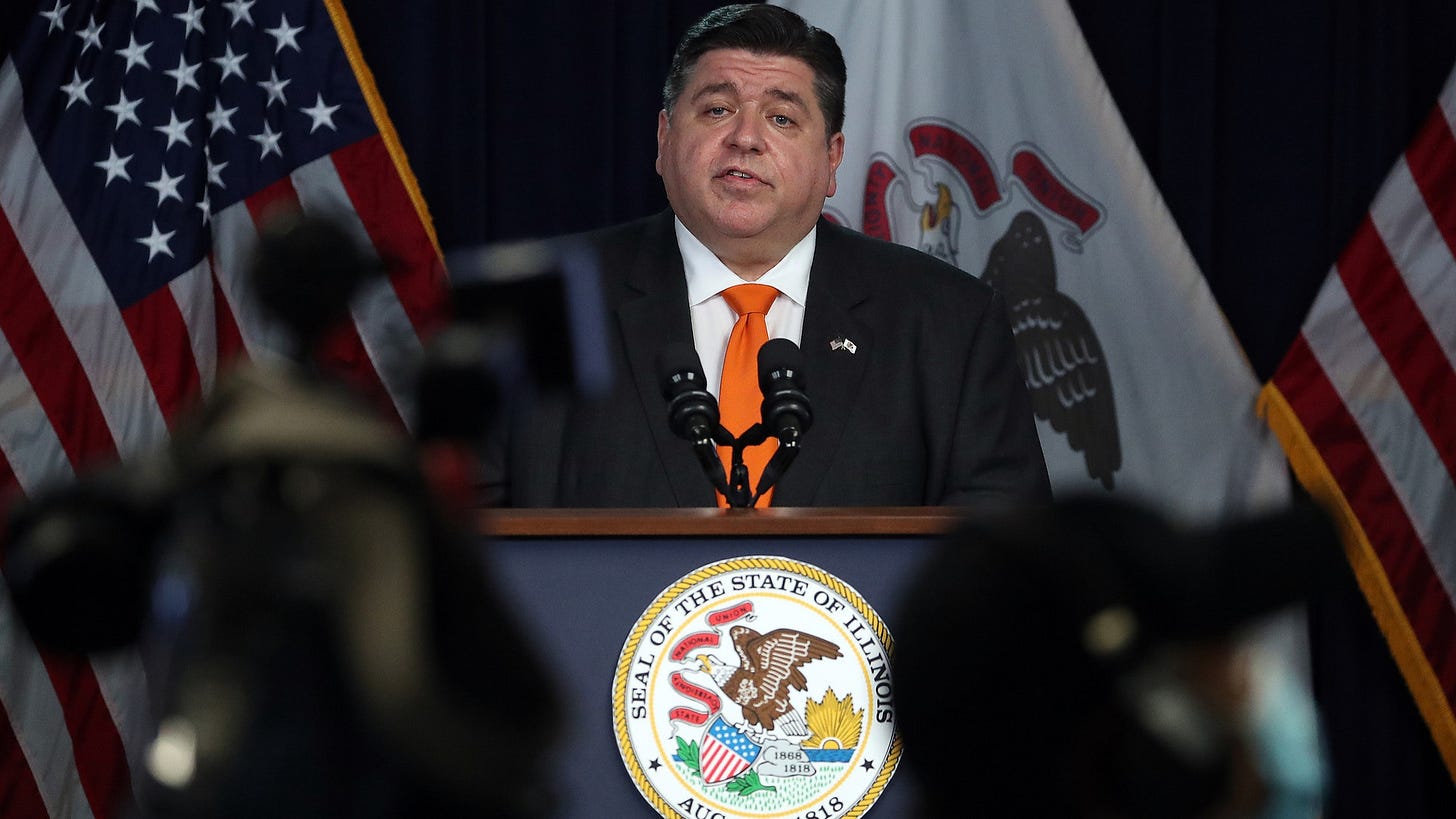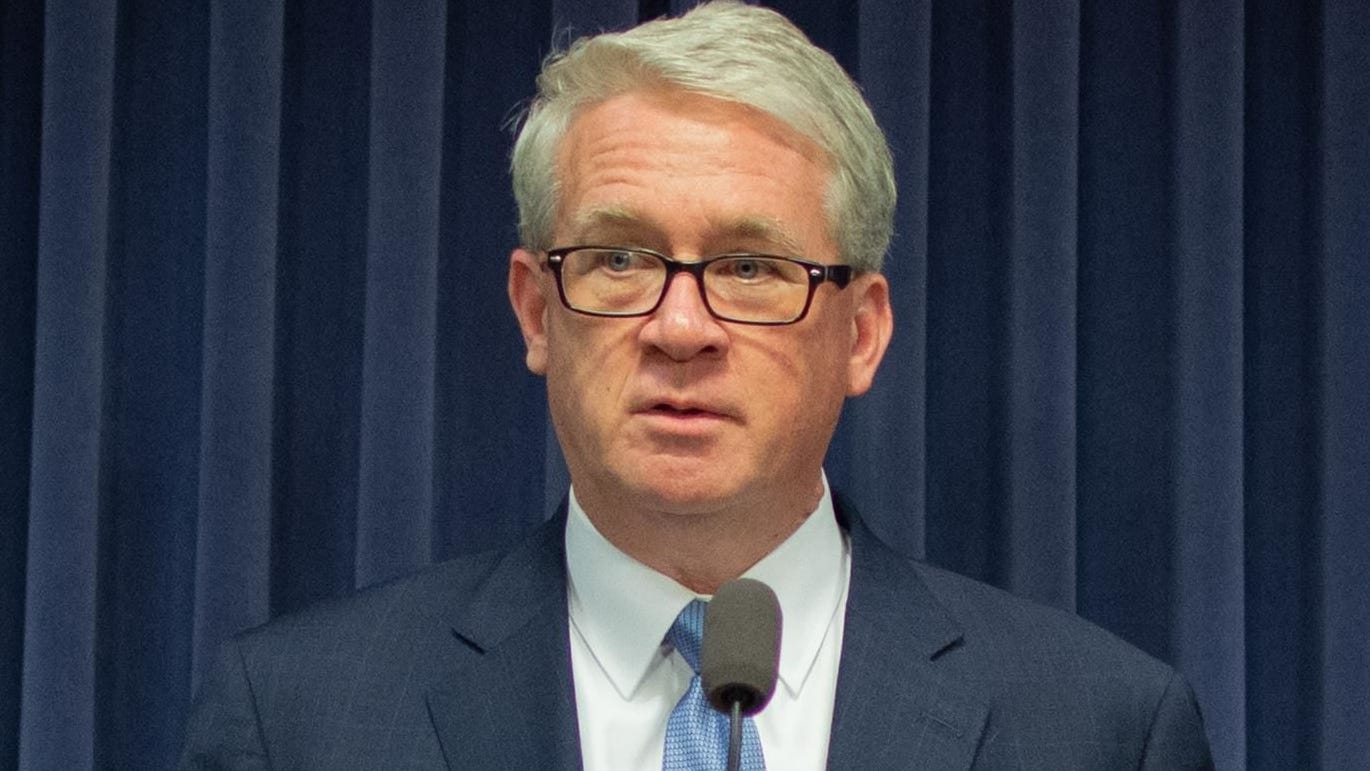THE ILLINOIZE: Thursday Free for All
February 10, 2022
Good morning and happy Thursday.
I was putting the finishing touches on the e-mail last night after we put the baby down and my wife had the Olympics on TV when sorta-GOP candidate for Governor Richard Irvin’s campaign spot came on the Chicago NBC station.
She asked how much Irvin’s campaign spent on the 30-second commercial. Broadcast rates in Chicago are among the highest in the country and those get jacked up during a high profile event like the Olympics.
I looked it up. Irvin’s campaign spent $20,000 for the spot. A typical primetime spot would probably run in the $500-$1,000 range. So, yeah, the spending is already off the charts.
Thanks so much for all of your support as we continue to grow The Illinoize. Thank you for sharing our content on social media and sending us thoughts and ideas. But, we need you to join us as a paid subscriber to continue to provide our content for you.
A year-long subscription gets you three newsletters per week as well as our two Free for All e-mails. It also gets you breaking news alerts, exclusives, and previews of things like videos before everyone gets them.
It’s just $75 per year or $7.99 per month. Join us and our growing community by clicking below.
As always, drop me a note at patrick@theillinoize.com with questions, comments, thoughts, concerns, and suggestions. I love to hear from you.
Let’s get to it.
YOUR THURSDAY FREE FOR ALL
(note: we’re not responsible for paywalls and restrictions from other news outlets)
Gov. J.B. Pritzker will lift indoor mask mandate on Feb. 28, but rules will remain in place for schools (Chicago Tribune)
Illinois Gov. J.B. Pritzker will lift his indoor mask mandate for most public places on Feb. 28 if the state’s largest coronavirus surge continues to subside, a move that comes as Democratic governors across the country begin loosening rules in response to improving data and an increasingly pandemic-weary public.
Pritzker is not dropping masking rules for schools, however, as his administration seeks to overturn last week’s court ruling that called into question his legal authority for mandating face coverings, quarantines and, for school staff members, vaccinations or testing.
In announcing his decision, Pritzker cited a rapid drop in the number of patients hospitalized with COVID-19 since that figure reached an all-time high in mid-January during a surge, driven by the highly contagious omicron variant, that put enormous strain on the state’s health care system.
“We are on track to come out on the other side of this latest COVID storm in better shape than even the doctors expected,” Pritzker said Wednesday. “If these trends continue, and we expect them to, then on Monday, Feb. 28, we will lift the indoor mask requirement for the state of Illinois.”
The governor was quick to dismiss critics who contend the decision is motivated more by politics than by public health considerations.
“These are the same people that wanted us to take masks off or encouraged people not to get vaccinated back when we ... had rising infections and rising hospitalization, so it’s hard to take them seriously at this point,” he said.
Republicans in the state legislature have repeatedly characterized Pritzker’s mask mandate as an overreach of his executive authority, saying such a policy needs to be decided on by lawmakers.
“He has not invited Republicans to participate in any meaningful discussion, whether it’s in a closed meeting of leaders but also on the floor of the House of Representatives and chambers,” House GOP leader Jim Durkin of Western Springs said Wednesday during an unrelated news conference. “The governor has taken this ‘going-alone’ approach too long.”
Durkin also called for an end to masking in schools. “Let’s let parents and children go back to schools without having to deal with this mask situation,” he said.
Despite Pritzker’s intention to continue requiring masks in schools for the time being, that issue has been complicated by a Sangamon County Circuit Court judge’s decision last week to block the state and school districts named in a set of lawsuits from enforcing the requirement for students and teachers named as plaintiffs in the case. The state is asking an appellate court to reverse the ruling.
The legal limbo has created chaos for school districts this week as they grapple with whether to continue requiring masks or make them optional.
Related: GOP reaction (The Illinoize)
Reactions mixed to Pritzker's plan to end state mask mandate (Champaign News-Gazette)
Pandemic endgame: As Illinois aims to ease masking restrictions, experts weigh in on the right time to return to normalcy (Chicago Tribune)
Archdiocese of Chicago making masks optional for suburban schools starting Thursday (Daily Herald)
Another man won’t face murder charge after change to state law; Republicans say SAFE-T Act should be repealed (Chicago Sun-Times)
For the second time this week, Cook County prosecutors cited changes to the state’s felony murder statute as the reason for not charging a man accused of being involved in a deadly shootout that led to a murder.
On Wednesday, Assistant State’s Attorney James Murphy said 22-year-old Tayvon Powe would have faced a first-degree murder charge prior to last summer when the statute’s changes went into effect.
“If this was prior to July of [2021] when the change in the law that went into effect, this defendant would be facing first degree murder charges,” Murphy told Judge Mary Marubio at Powe’s bond hearing. “ … He is not facing those first-degree murder charges at this point,”
Earlier in the day, Illinois Republicans pounced on a case in which a grand jury this week declined to approve murder charges against Travis Andrews, who was accused of causing the death of a woman in December who was struck by a stray bullet during a shootout in Austin.
House Republican leader Jim Durkin, R-Western Springs, called for the repeal of the SAFE-T Act and cited Andrews’ case as evidence that the “changes to the felony murder law, pushed by delusional demagogues of the defund the police movement, have created a consequence-free environment for criminals in Illinois.”
Durkin said the lack of murder charges against Andrews represented a “dismal failure.”
But advocates for the bill’s reforms accused Republicans of making intentionally misleading statements about what the changes to the felony murder rule actually does, and say it’s unfair that defendants who didn’t kill anyone face a minimum 20-year sentence with no opportunity to get time off for rehabilitation.
The SAFE-T Act “only ensures someone is culpable for first-degree murder before they face our state’s harshest possible punishment,” Restore Justice Illinois responded.
State Rep. Justin Slaughter, D-Chicago, who helped pass the SAFE-T Act, said those charges were evidence that Andrews wasn’t getting away with murder, as Republicans had claimed. Gov. J.B. Pritzker also emphasized the harsh consequences Andrews faces.
“The SAFE-T Act package makes our justice system fairer and more effective at the same time, but Republicans are continuing their scare tactics by twisting the law and the facts of this case in order to score political points in an election year,” Slaughter said.
Republicans obviously believe this law is their linchpin to winning on the crime issue this November, so these calls for repeal are purely political and hold no sense of reality. There is no world, no matter the polling, where Democrats repeal this law.
If Republicans really wanted to make a difference, I’ll be the Speaker would have a conversation about ways to improve the bill. It’s the difference between governing and campaigning.
This issue may be the one that tells us what the GOP really wants to do.
Related: Opinion: How violence spread during the pandemic—and what to do about it (Crain’s Chicago Business)
New U.S. attorney for central Illinois sharpens focus on violent crime and human trafficking (WGLT Radio)
Obama kicked off presidential campaign 15 years ago in Springfield: A look back and forward (Chicago Sun-Times)
Thursday marks 15 years since Barack Obama officially kicked off his first presidential campaign on the steps of the Old State Capitol in Springfield.
Feb. 10, 2007.
It was a long day. Started in Springfield. Ended after rallies in Cedar Rapids and Waterloo, Iowa, the state with the 2008 kickoff presidential caucus.
The night before, Sen. Barack Obama, wife Michelle and others in their entourage arrived at the hotel around 10 p.m. A smiling Emil Jones — the state Senate president who had mentored Obama when he was a state senator — was wearing a black T-shirt with a picture of Obama superimposed on the Old State Capitol.
The city was chosen because of its symbolism. Springfield was where Obama — and Abraham Lincoln — started their political careers.
The Old State House was the obvious site for the man on a quest to be the nation’s first Black president. It was the location of Lincoln’s famous “a house divided against itself cannot stand” speech in 1858 denouncing slavery.
Obama made his entrance to “City of Blinding Lights,” the U2 hit that would be — and is to this day — his signature walk-out song.
Obama in his speech talked about how there was “a certain audacity” to the freshman senator making a bid for the White House.
“I know that I haven’t spent a lot of time learning the ways of Washington. But I’ve been there long enough to know the ways of Washington must change,” he said.
“And that is why, in the shadow of the Old State Capitol, where Lincoln once called on a house divided to stand together, where common hopes and common dreams still live, I stand before you this day to announce my candidacy for president of the United States of America.”
Obama’s “hope” and “change” campaign slogans suggested that, as president, he could create some permanent transformation.
I was there that day. I had ridden a bus over with a bunch of Champaign County Democrats to tell the story through their eyes. It was so cold my old school radio minidisc recorder had to take refuge next to the hand warmers I had stuffed in my pocket so it wouldn’t freeze.
Even by 2007, I wasn’t particularly bedazzled by political events, but the size of the crowd, the energy of the crowd, and the way the media covered it (MSNBC had Chris Matthews live on a makeshift set) made you know it was a big deal.
Honestly, before that day, I never thought Sen. Obama could be president.
Tells you a lot about my prognostication skills.
JOIN US











